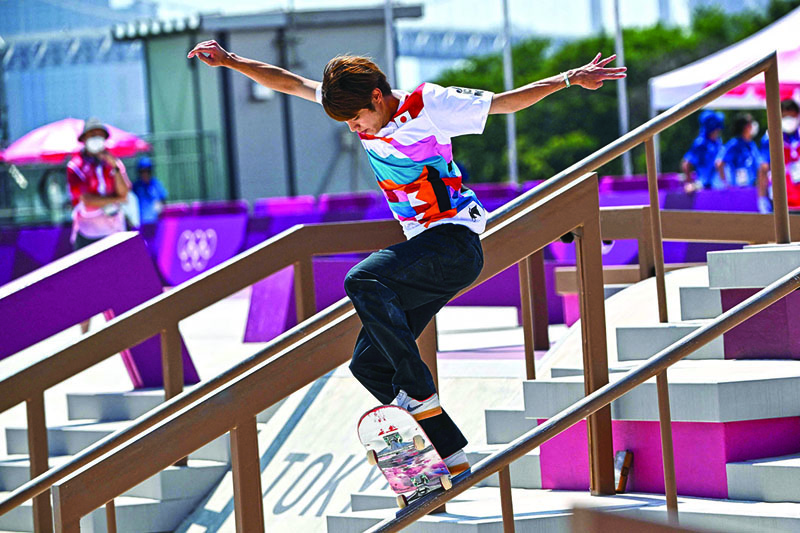 Japan's Yuto Horigome competes in the men's street final during the Tokyo 2020 Olympic Games on Sunday.
Japan's Yuto Horigome competes in the men's street final during the Tokyo 2020 Olympic Games on Sunday.
At the Tokyo park where skateboarding's first Olympic gold medalist, Yuto Horigome, learned to grind, ollie and kick-flip as a child, the sport is now banned. It's just one example of Japan's strict attitude to skateboarding, which fans say they hope will change following Horigome's victory on Sunday. The 22-year-old's top score in the street competition at Tokyo 2020 sparked an ecstatic reaction in Japanese media and praise from Prime Minister Yoshihide Suga, who said his tricks had "enchanted the world".
But teenage skaters in Tokyo told AFP there are not enough skate parks to practise in, and they are often ordered to put their boards away. After he landed three huge tricks in a row to beat American favourite Nyjah Huston, Horigome was asked about the Tokyo district where he grew up, not far from the Olympic skateboarding venue. He singled out Ojima-Komatsugawa Park, a green space with benches, steps and slopes, where a signboard now warns: "No skateboarding or riding of motorized vehicles."
Despite the ban, a lone 16-year-old turned up with his skateboard to celebrate Horigome's achievement on Sunday. "I came here to train, as the victory rekindled my motivation," the high-school student, Taiki Taniyama, told AFP. "I'm so proud of him... I know it's hard, but I want to skateboard like him in the future," he smiled.
'Supposedly dangerous'
The homeboy's win made top news in Japan. The Mainichi and Yomiuri dailies issued extra editions full of photos and stories about the triumphant return home for Horigome, who is now based in the United States. "Congratulations for becoming the first gold medalist! You enchanted the world with a series of stunning tricks," Prime Minister Suga tweeted. And the Nikkan Daily daily hailed "A major step for skateboarding with Horigome's gold."
But teenage skaters in Tokyo's western suburbs told a different story. "Japan is quite strict when it comes to skateboarding," Yuma Nagase, 19, told AFP outside Komazawa Skate Park. "It would be great if it could be more relaxed after this win." The skate park is currently closed because of a virus state of emergency in the capital, which has also forced most Olympic events behind closed doors. There "aren't enough" dedicated skate parks in Japan, Nagase said. "For example, here, when we gather to have fun and skate, some security person would randomly come and complain that we are too loud, and ask us to stop."
Deo Suzuki, also 19, said he hoped the victory would help Japan change its views on the sport. "There are many places in Japan where skateboarding is banned, because it's supposedly dangerous. I hope it will get more open, and more skateparks will open," he said. After his win, Horigome said he became interested in skateboarding thanks to his father Ryota, who would take him to Ojima-Komatsugawa Park to skate.
Ryota told reporters his son's accomplishment had not yet sunk in. "This is too great a thing. It just does not feel real," he told reporters. "His biggest strength is that he skates and has more fun than anyone else." And the win may have already inspired Japan's future skateboarding stars. Japanese-Brazilian 14-year-old Ayumi Yamaguchi-Irisu, practicing outside Komazawa Skate Park with her younger brother under their mother's watch, called Horigome's feat "amazing". "I just started skateboarding. It made me want to try harder... I started practicing ollies today, and I've got the feeling that I succeeded after watching (Horigome) do it." - AFP

